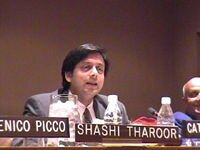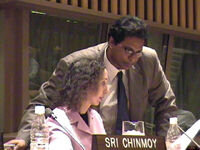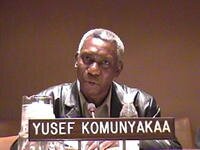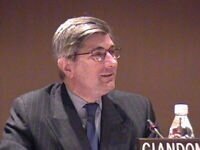Dialogue Among Civilizations Through Poetry
Rattapallax organized Dialogue Through Poetry / UNESCO World Poetry Day Readings in New York City.
Rattapallax organized Dialogue Among Civilizations Through Poetry in 2001
Pulitzer Prize-winning poet Yusef Komunyakaa joined renowned poets Joyce Carol Oates, Mei-mei Berssenbrugge, Sri Chinmoy and James Ragan for an evening of “Dialogue Among Civilizations Through Poetry” on Thursday, March 29, 2001 at the United Nations Building in NYC.
In 1998, the United Nations General Assembly declared 2001 as the “United Nations Year of Dialogue Among Civilizations” to foster tolerance, respect and cooperation among peoples. To further this aim, Rattapallax Press together with the United Nations Society of Writers, presented a series of literary programs around the world. A poetry evening at the United Nations is one of over 200 poetry readings in over 100 cities worldwide. Participants included Guild Complex in Chicago, Chinese University of Hong Kong, and the 14th Street Y in New York City. Individuals living in the city where the events were held coordinated each reading. Several special readings in international territories included 2001 Mallory and Irvine Research Expedition to Mt. Everest, Casey Station in Antarctica, and scientific boat in the West Philippine Sea.
2002 Dialogue Through Poetry/World Poetry Day
Wednesday 20, March at 7:00 pm. The New School, Tishman Auditorium at 66 West 12th St., New York City. FREE. Featured poets and readers: Breyten Breytenbach, Shashi Tharoor, Bob Holman, Sonia Sanchez, Sharon Olds and others.
2003 Dialogue Through Poetry/World Poetry Day
Wednesday 19, March at 8:00 PM. Mason Hall, Baruch College, 17 Lexington Ave. at 23rd St., New York City, FREE. Featured poets and readers: Robert Creeley, Marilyn Hacker, Vijay Seshadri, Grace Schulman, Amiri & Amini Baraka. Winners of the High School “World Poetry Day” Writing Competition.
Literary Conference at the UN
An international literary conference co-organized by Poetry International–Rotterdam involving acclaimed Australian poet John Kinsella, David H. Lynn, editor of the Kenyon Review (USA), Ram Devineni (Rattapallax) and editors from around the world. To investigate ways to stimulate dialogue among cultures through poetry using new technologies and international resources. The central focus is the development of an internet portal for poetry through Poetry International Foundation in Rotterdam.
Mohammed Bennis, Coordinator of House of poetry Casablanca, Morocco
Iztok Osojnik, Director of Slovenian Writers Association and International Poetry festival Vilenica, Slovenia
Charles H. Rowell, Editor of Callaloo, USA
Therese Eiben, Editor of Poets & Writers Magazine, USA
William Wadsworth, Executive Director of Academy of American Poets, USA
Peggy Randall, Executive Director of CLMP, USA
Greg Gatenby, Director of Harbour Front Series, Toronto, Canada
Rene Steinke, Senior Editor of Literary Review, USA
Rebecca Wolff, Editor of Fence, USA
Jenine Gordon Bockman, Editor of Literal Latte, US
Guy Shahar, Editor of Cortland Review, USA
Participants:
David H. Lynn, Editor of The Kenyon Review, USA
John Kinsella, Editor of Stand and Salt in the UK/Australia and International Editor of The Kenyon Review, USA
Ram Devineni, Publisher of Rattapallax, USA
Tatjana Daan, Director of Poetry International Foundation, The Netherlands
Erik Menkveld, Editor of Tirade and programme leader of Poetry International Foundation, The Netherlands
Arnolda Jagersma, Project Coordinator of Poetry International Foundation, The Netherlands
Ricardo Ibarlucia, Editor of Diario de poesia, Argentina
Al Creighton, University of Guyana
Herbert Leibowitz, Editor of Parnassus, US
Dialogue Through Poetry Week
In addition to the reading at the UN, there were over 200 poetry readings in over 150 cities worldwide. Participants included the Guild Complex in Chicago, Chinese University of Hong Kong, and the 14th Street Y in New York City. Individuals living in the city where the events were held coordinated each reading. Most of the readings occurred during the last week in March 2001. The events were organized by Larry Jaffe.
Readings on International Grounds
There were several readings on “international ground.” Like the United Nations building, these locations are not owned by any country, but owned by the peoples of the world. The poem that was read was P.K. Page’s, Planet Earth, which was selected by National Book Award winner Marilyn Hacker and submitted by Susan MacRae. The poem was read at the United Nations, Mt. Everest, West Philippines Sea and Antarctica.
From March 2001 to May 2001, Eric Simonson lead an expedition up the highest mountain in the world–Mt. Everest (8000 meters/ 22,000 feet). They made an attempt through the North side through Tibet. They read a poem by William Blake at Everest Base Camp in March 2001 and read the poem again on the summit in May.
ANARE Casey Station, Wilkes Land, Antarctica at 0130 hours Greenwich Mean Time (GMT) on Friday 30 March 2001. The reader was Paul Cullen, Station Leader, Casey Station 2001 The cameraman and sound recordist is Henry Banon, Communications Technical Officer, Casey Station 2001. ANARE (Australian National Antarctic Research Expedition) operates three permanent continental bases in Antarctica, and one at Macquarie Island in the sub-Antarctic. The purpose of our presence is to help preserve Antarctica as a haven for peace and science, to better understand our global climate, to protect the Antarctic environment and to maintain the Antarctic Treaty system. Casey is located at 66º 17′ S, 110º 32′ E – just outside the Antarctic Circle – and is the third Australian station to occupy a site on Vincennes Bay.
The reading was held on Friday March 30 at 7 pm local time in the West Pacific ocean at about latitude 17 deg 41 min N, longitude 137 deg 55 min E in transit to our next drill site. Dr. Carl Richter with the Ocean Drilling Program organized the reading. Photo: Anastasia Ledwon and Carl Richter. The Ocean Drilling Program (ODP) is funded by the U.S. National Science Foundation and 22 international partners (JOIDES) to conduct basic research into the history of the ocean basins and the overall nature of the crust beneath the ocean floor using the scientific drill ship JOIDES Resolution. Joint Oceanographic Institutions, Inc. (JOI), a group of 14 U.S. institutions, is the Program Manager. Texas A&M University, College of Geosciences is the Science Operator. Lamont-Doherty Earth Observatory of Columbia University provides Logging Services and administers the Site Survey Data Bank.
Opening Remarks for Dialogue through Poetry 2002 by Pat Duffy
Let me begin by welcoming you to this opening reading for the second annual Dialogue through Poetry and UNESCO’s World Poetry Day– with this year’s special theme, ‘can poetry create a culture of peace and non-violence in the world?.’ Your presence here this evening makes you part of a historic cultural event taking place in locations across the seven continents. All across the world from this auditorium to the world’s highest mountain peaks– poets will be gathering to speak the language of poetry. Children have gathered at Aksara Bookstore in Jakarta to read poems inspired by this year’s theme, while Arab and English poets are meeting tomorrow at Shepherd’s Bush Library in London at a reading sponsored by Banipal magazine. And in Tel Aviv, Jewish and Palestine poets are reading at Tmuna Theater in these troubling times. There are readings in Paris at the Red Wheelbarrow, in Pusan, Korea at Young Kwang Bookstore, in Moscow at the 6 Gallery, at Mumbai’s Press Club, and at the West Torrens Library in Adelaide, Australia.
This program started last year at the United Nations with Giandomenico Picco who was appointed by the Secretary-General to promote the “Year of Dialogue Among Civilizations.” Ram Devineni, the publisher of Rattapallax, and Bhikshuni Weisbrot, United Nations Society of Writer’s Secretary, approached Mr. Picco and proposed a program that involved a literary component to the “Year of Dialogue.” With his approval, they setup a major reading at the UN and hundreds of readings around the world including a literary conference. There were also three special readings on International territory–a reading at a science station in Antarctica, on a boat in the West Philippines Sea and on the summit of Mt. Everest.
Last year’s ‘Dialogue among Civilizations through Poetry’ event was so successful that it led to this year’s ‘Poetry on the Peaks’. Perhaps some of you discovered this year’s event by seeing one of the many posters for it that are displayed around the city. And maybe you saw that question written on the poster, “Can poetry help create dialogue and a culture of peace?” Can poetry help to create a dialogue and culture of peace? Does it sound naive? Or is there a way our everyday dialogue can learn from poetry’s masterful understanding and use of language? A good poem knows just when to speak, just when to be silent. It knows just when to repeat a thought, and just when to say it only one time. Imagine if we could apply even a little of poetry’s great sensitivity — and wisdom — to our everyday dialogues — Whether or not our relationship with another person survives depends on the quality and success of our dialogue with that person. And whether or not all of us survive on this planet will depend on the quality and success of our dialogue with one other across continents and cultures. The five poets we have here with us this evening represent a diversity of styles and visions as they speak with the voice of the creative self, the literary voice — which the writer Alice McDermott once called “the voice of the beauty of the world”.
Message by the Director-General of UNESCO on the occasion of World Poetry Day, 21 March 2003 — Koïchiro Matsuura
Delivered by Mr. J. Kyazze, UNESCO Representative to the United Nations
“Poetry is human language reduced to its essential rhythm,” said Mallarmé. Poetry is indeed a language that delves deep into the human soul and expresses the mysterious meaning of existence. As the highest expression of a language, it should occupy a special place in our lives.
Language, with its distinctive rhythms and music, the interplay of words and their many meanings, is the raw material of all poetry. Fables, myths and legends, heroic deeds and tales have been passed on, at first orally and then by way of a variety of writing systems, since the dawn of humanity. For each community, language is a badge of identity and a means of discovering the world, and also one of the main vectors of cultural diversity.
Poetry is a major cultural factor, a total language that constitutes the expression of a deep-seated desire to live with others and hence an essential instrument for bringing peoples closer together. It is a reflection and mirror of communities and the foremost vehicle for self-affirmation, but it is also a decisive lever in creativity, progress and, shared development.
Poetry therefore helps us to live together. It is essential to intercultural dialogue and harmonious interaction among the different communities of the world. Encouraging its creation, its dissemination, and its translation is another way of promoting cultural diversity, a vital source of inspiration conveyed by the living unity of poets through the myriad facets of their creativity.
Today, 21 March, World Poetry Day, I invite Member States, associations, and each and every individual to celebrate poetry and to reflect on the fundamental role it plays in intercultural dialogue, a pledge of peace.
Opening Remarks for Dialogue through Poetry 2003 by Pat Duffy
Let me begin by saying how thrilled I am to see all of you here this evening at the New York City reading for the third annual Dialogue through Poetry sponsored by Rattapallax Magazine and Baruch College Performing Arts Center. Dialogue through Poetry also shares this week with and honors UNESCO World Poetry Day and the start of the UN Decade for Literacy. Your presence here this evening makes you part of a historic cultural event celebrating poetry all across the world-Dialogue through Poetry readings will be taking place in literary venues from this auditorium in New York City, to Valpajo Chile, to Moscow, to London, to Paris, to Belgrade, where poets will gather to speak the language of poetry and to celebrate the special power and beauty of that language. In marking UNESCO World Poetry Day and the first Dialogue through Poetry event back in 2001, Harri Holkeri the President of the United Nations General Assembly that year said, “Poets are our cultural clairvoyants and porte-paroles of truth. Poetry is one of the most powerful ways of expressing both individual experiences and the experiences and values of whole nations… It is also a way of achieving better understanding of our differences – understanding that cultural diversity is richness and not a threat.”
This evening, we will be celebrating the rich diversity of visions expressed through written words. Some of our best and most respected contemporary poets will be reading their work to us tonight. And we’ll also hear from some of the new generation of poets on the scene, the winners of the New York City high school ‘World Poetry Day’ contest, who will be reading their prize-winning poems to us this evening. With these prizes, we hope our younger writers will be encouraged to continue refining and developing their use of language – because it is in the evolved use of language that we can uncover meaning in our daily activities-and it is the evolved use of language, in the sensitive use of words, that we can also uncover the hope for peace. Ultimately, whether or not we survive together on this planet — in all our magnificent diversity – will depend on our ability to use words and not weapons. Is there a connection between poetry and the quest for peace? What can our everyday dialogue learn from poetry, that most refined use of language-poetry? Unlike many of our every day dialogues, Poetry always knows just the right pattern of words to say to send its message. Poetry always knows just when to speak and just when to be silent-just when to repeat a phrase and just when to say it only one time. If we could only learn from poetry’s exquisite sensitivity to language — and apply even a little of that sensitivity to our everyday dialogues with one another – -knowing just the right pattern of words to say — knowing just when to speak, just when to be silent — just when to repeat a phrase and just when to say it only one time-if we could learn from poetry’s deep understanding of the use of language — perhaps there would be hope for our personal relationships to survive better and longer and more peacefully-and perhaps there would be hope for the relations among nations of the world to survive better and longer and more peacefully.
The poems you will hear tonight represent a diversity of styles and visions as they speak with the voice of the creative self, the literary voice, which the writer Alice McDermott once called, “the voice of the beauty of the world.”
World Poetry Day Writing Competition–New York City: The First Prize was $300 and Second Prize $200. All prize-winning poets read at the annual World Poetry Day reading in March, 2003. There were also six honorable mentions. The two winners were published in Rattapallax magazine, as well as in Poetry in Performance 31. All winners and honorable mentions received a gift package of books and certificate of participation.
Katarzyna Kozanecka received First Prize ($300.00) in the World Poetry Day competition for “on the outskirts.” Teacher: Eric Grossman from Stuyvesant HS, New York. Mohammed Abbasi received 2nd Prize ($200.00) in the World Poetry Day competition for “War Season.” Teacher: Dr. Sylvia Weinberger from Brooklyn Technical High School, Brooklyn. Arianna C. Freyre received Honorable Mention in the World Poetry Day competition for your entry “Oppression.” Teacher: Myron Moskowitz from Townsend Harris High School, Flushing. Melissa Kimiadi received an Honorable Mention in the World Poetry Day competition for your entry “Sunday’s Best.” Teacher: Dr. Sylvia Weinberger from Brooklyn Technical High School, Brookyn. Marianne Lebedinskaya received an Honorable Mention in our World Poetry Day competition for your entry “After the War: Land at Last.” Teacher: Maria Buccellato from John Dewey High School, Brooklyn. Alice Chan received an Honorable Mention in our World Poetry Day competition for your entry “may you forgive me.” Teacher: Eric Grossman from Stuyvesant HS, New York. Presented in association with Baruch College Performing Arts Center, Rattapallax, and CCNY Poetry Outreach Center.
War Season
by Mohammed Abbasi
The harvest season has arrived
A struggle begins
The women are restless
The workingmen are gone
The people impoverished
They come to gather fruits
Which are overripe
The aroma of rotting melons
And the tainted grapes
They smell of sour juice
The one full-grown fruits
That nourished thousands
All through the bleak winters
Have become bitter and vicious
The beautiful colors of
Red, sweet apples
Purple, juicy grapes
Green, immense watermelons
Have transformed
The lush, moist and newly picked fruits
Sit on the cold floor
Black, hard and ugly
The scene is dark
The grapple has overcome the grain
on the outskirts
by Katarzyna Kozanecka
a khaki convoy nearing
and farthering away.
stirring crows to wing,
kicking up mud in flecks
against the house-wall
on which hangs a poster
for a film; the house-wall
around whose corner a dog
hangs by the throat.
its snowed coast thawing,
its snowed coast thawing.
the film is przed-wiosna,
before-spring.
maybe in west in west west.
i’ve no eyes for it.
my winter’s longer than that world’s
by an arm of rope.








